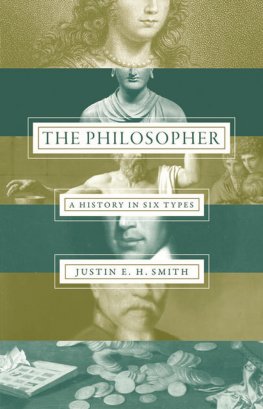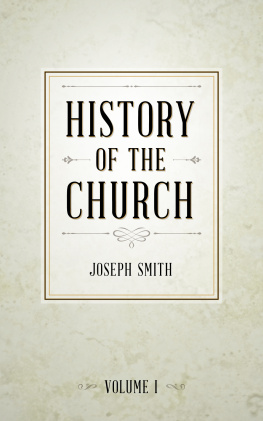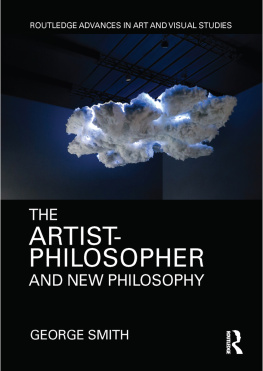Justin E. H. Smith - The Philosopher: A History in Six Types
Here you can read online Justin E. H. Smith - The Philosopher: A History in Six Types full text of the book (entire story) in english for free. Download pdf and epub, get meaning, cover and reviews about this ebook. year: 2017, publisher: Princeton University Press, genre: Religion. Description of the work, (preface) as well as reviews are available. Best literature library LitArk.com created for fans of good reading and offers a wide selection of genres:
Romance novel
Science fiction
Adventure
Detective
Science
History
Home and family
Prose
Art
Politics
Computer
Non-fiction
Religion
Business
Children
Humor
Choose a favorite category and find really read worthwhile books. Enjoy immersion in the world of imagination, feel the emotions of the characters or learn something new for yourself, make an fascinating discovery.
- Book:The Philosopher: A History in Six Types
- Author:
- Publisher:Princeton University Press
- Genre:
- Year:2017
- Rating:5 / 5
- Favourites:Add to favourites
- Your mark:
- 100
- 1
- 2
- 3
- 4
- 5
The Philosopher: A History in Six Types: summary, description and annotation
We offer to read an annotation, description, summary or preface (depends on what the author of the book "The Philosopher: A History in Six Types" wrote himself). If you haven't found the necessary information about the book — write in the comments, we will try to find it.
The Philosopher: A History in Six Types — read online for free the complete book (whole text) full work
Below is the text of the book, divided by pages. System saving the place of the last page read, allows you to conveniently read the book "The Philosopher: A History in Six Types" online for free, without having to search again every time where you left off. Put a bookmark, and you can go to the page where you finished reading at any time.
Font size:
Interval:
Bookmark:

THE
PHILOSOPHER
THE
PHILOSOPHER
A HISTORY IN SIX TYPES
JUSTIN E. H. SMITH
PRINCETON UNIVERSITY PRESS
PRINCETON AND OXFORD
Copyright 2016 by Princeton University Press
Published by Princeton University Press,
41 William Street, Princeton, New Jersey 08540
In the United Kingdom: Princeton University Press,
6 Oxford Street, Woodstock, Oxfordshire OX20 1TR
press.princeton.edu
Jacket art, from the top: Fig. 1: Margaret Lucas Cavendish, Duchess of Newcastle. Print Collection, Miriam and Ira D. Wallach Division of Art, Prints, and Photographs. The New York Public Library. Astor, Lenox, and Tilden Foundations, Fig. 2. Buddha Sakyamuni, courtesy of Carlton Rochell, Fig. 3. The Death of Socrates, 1787, oil on canvas, by Jacques-Louis David, Fig. 4. Baruch de Spinoza, oil painting, c. 1665; in the Herzog-August Bibliothek, Wolfenbuttel, Fig. 5. Portrait of a Chinese Mandarin, oil on canvas, c. 18251852, by George Chinnery. Bequeathed by Claude D. Rotch, Fig. 6. The Money Changer and his Wife, 1539, oil on panel, by Marinus van Reymerswaele, Museo del Prado, Madrid
All Rights Reserved
Library of Congress Cataloging-in-Publication Data
Names: Smith, Justin E. H.
Title: The philosopher : a history in six types / Justin E. H. Smith.
Description: Princeton, NJ : Princeton University Press, 2016. |
Includes bibliographical references and index.
Identifiers: LCCN 2015034074 |
ISBN 978-0-691-16327-7 (hardcover : alk. paper)
Subjects: LCSH: Philosophy. | Philosophers.
Classification: LCC BD21 .S57 2016 | DDC 100dc23
LC record available at http://lccn.loc.gov/2015034074
British Library Cataloging-in-Publication Data is available
This book has been composed in Linux Libertine O
Printed on acid-free paper.
Printed in the United States of America
10 9 8 7 6 5 4 3 2 1

This book is dedicated to the memory of
BUD KORG (19382015)
Now he who wonders and is perplexed feels that he is ignorant (thus the myth-lover is in a sense a philosopher, since myths are composed of wonders).
ARISTOTLE, Metaphysics, BOOK I
Let the fish philosophise the ice away from the Rivers in winter time.
JOHN KEATS, Letters (1819)
these unwholsome vapours, that distempered the Aer, to the very raising of Storms and tempests; upon which a Philosopher might amply discourse.
JOHN EVELYN,
Fumifugium; or, the Inconveniencie of the Aer and Smoak of London Dissipated (1661)
CONTENTS
Featuring the Curiosa 21
Featuring the Sage 54
Featuring the Gadfly 120
Featuring the Ascetic 159
Featuring the Mandarin 190
Featuring the Courtier 223
ACKNOWLEDGMENTS
Undoubtedly the greatest portion of gratitude must go to my editor at Princeton University Press, Rob Tempio, who has had the vision to first recommend this project to me. In matching me with this task, and this new way of engaging with philosophy, he saw more clearly than I an inclination that existed only in potentia, and its coming to actuality is entirely the result of his willingness to cultivate it. Throughout the process he has given expert and nuanced advice on the form the book should take, making intuitive suggestions that consistently show the mind of a real lover of books at work. I have also received invaluable intellectual guidance and input throughout the writing process from Stephen Menn, as well as from D. Graham Burnett, James Delbourgo, Jonardon Ganeri, Aaron Garrett, Patrick Lee Miller, Steve Nadler, Dalia Nassar, Anne-Lise Rey, Adina Ruiu, Lisa Shapiro, John Sutton, Anand Vaidya, Stphane Van Damme, and Charles T. Wolfe. I have been fortunate to have early drafts of the manuscript, or portions thereof, read and commented on by Jerry Dworkin, Zoli Filotas, and Susanna Forrest. I have moreover benefited greatly from the opportunity to present portions of this work in venues at which I was able to receive feedback from such sharp minds as Ray Brassier, Karine Chemla, Tsuyoshi Matsuda, and Paul Yachnin, in Beirut, Cambridge, Kyoto, Paris, Sydney, and many other places besides. I am surely forgetting many other people, who will likely find my cryptomnesia at work in the following pages; the secret signs of their influence, I hope, can count in their own way as acknowledgments.
THE
PHILOSOPHER
INTRODUCTION
This book, an essay in the proper Montaignean sense, seeks to answer that most fundamental of philosophical questions: What is philosophy? It does so, however, in an unusual way: by refraining from proclamations about what philosophy, ideally, ought to be, and by asking instead what philosophy has been, what it is that people have been doing under the banner of philosophy in different times and places. In what follows we will survey the history of the various self-conceptions of philosophers in different historical eras and contexts. We will seek to uncover the different job descriptions attached to the social role of the philosopher in different times and places. Through historical case studies, autobiographical interjections, and parafictional excursuses, it will be our aim to enrich the current understanding of what the project of philosophy is, or could be, by uncovering and critically examining lost, forgotten, or undervalued conceptions of the project from philosophys distinguished past.
This approach could easily seem not just unusual but also misguided, since philosophy is generally conceived as an a priori discipline concerned with conceptual analysis rather than with the collection of particular facts about past practice. As a result of this widespread conception, most commonly, and it would be more unfamiliar still to the natural philosopher of the seventeenth century, who studied meteorological phenomena in order to discern the regularities at work in the world around us, and had no particular interest in devising new concepts for discerning these regularities. Thus when Deleuze and Guattari argue that philosophy is the activity of concept coining, they should really be saying that this is what they would like philosophy to be.
Philosophy has in fact been many things in the 2,500 years or so since the term was first used, and here we will be interested in charting its transformations. We will be equally interested in exploring the question whether the activity of philosophy is coextensive with the term, that is, whether it is only those activities that have been explicitly carried out under the banner of philosophia that are to be considered philosophy, or whether there are also analogical practices in cultures that have evolved independently of the culture of ancient Greece that can also be called by the name philosophy. I will be arguing that they can and should be, but even if we restrict our understanding of philosophy to those cultural traditions that bear some historical and genealogical relationship to the practice in ancient Greece that was first called by this name, we still discover a great variety of divergent conceptions of what the activity in question is. Let us, in any case, in what follows, use the term Philosophia, with a capital P, when we wish to explicitly mark out the genealogical connection between authors, arguments, and texts throughout the broader Greek, Roman, Islamic, and Christian world, while using philosophy to designate cultural practices, wherever they may occur, that bear some plausible affinity to those cultural practices that fall under the heading of Philosophia, which, again, signals a particular historical tradition and thus, strictly speaking, a proper noun.
Next pageFont size:
Interval:
Bookmark:
Similar books «The Philosopher: A History in Six Types»
Look at similar books to The Philosopher: A History in Six Types. We have selected literature similar in name and meaning in the hope of providing readers with more options to find new, interesting, not yet read works.
Discussion, reviews of the book The Philosopher: A History in Six Types and just readers' own opinions. Leave your comments, write what you think about the work, its meaning or the main characters. Specify what exactly you liked and what you didn't like, and why you think so.











